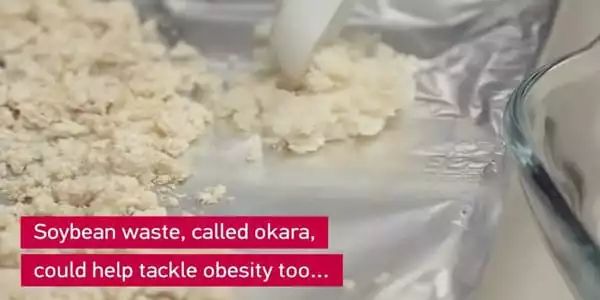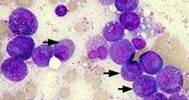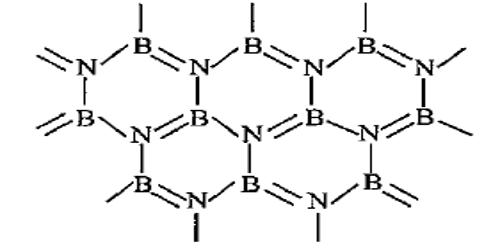An international team of researchers from Nanyang Technological University (NTU Singapore) and Waseda University in Japan discovered that fermented soybean waste, or okara, could increase fat metabolism and attenuate the consequences of diet-induced obesity.
The scientists from NTU Singapore and Waseda demonstrated in laboratory experiments published in the peer-reviewed scientific journal Metabolites in February that mice fed a high-fat diet supplemented with fermented okara gained less body mass and had lower levels of fat and cholesterol after three weeks than mice fed the same diet but not fed any fermented okara.
With 14 million tonnes of okara produced each year and roughly a third of the world’s population overweight or obese, the scientists hope their discoveries may open the way for fermented okara to be integrated into healthy meals one day, thereby tackling the problems of food waste and obesity.
“We fermented okara and fed it to mice on a high-fat diet using a procedure similar to what is used to manufacture miso and soy sauce,” said Dr. Ken Lee, senior lecturer at the NTU School of Physical and Mathematical Sciences and co-lead author of the paper. Three weeks later, we discovered that these mice acquired less weight than mice fed a high-fat diet but not fermented okara. The mice that were fed fermented okara also had less fat and lower cholesterol levels.
Our findings suggest that fermented okara could help to mitigate the harmful effects of a high-fat diet, and could potentially be integrated in the diets of obese patients who find it difficult to make immediate lifestyle changes.
Dr. Ken Lee
“Our findings suggest that fermented okara could help to mitigate the harmful effects of a high-fat diet, and could potentially be integrated in the diets of obese patients who find it difficult to make immediate lifestyle changes.”
“Aspergillus oryzae and Aspergillus sojae, which are typical aspergillus fungi used to produce soy sauce and miso, were successfully combined to ferment okara,” said Dr. Shigenobu Shibata, Professor at Waseda University Graduate School of Advanced Science and Engineering and co-lead author of the paper. Fermented okara was demonstrated to lower obesity and improve aberrant lipid metabolism in mice when compared to unfermented okara. Tofu and soymilk are now generally regarded as healthy foods not only in Japan, but around the world, and the effective use of okara, an industrial waste, is consistent with the United Nations Sustainable Development Goals. I hope NTU and Waseda University, each with their unique strength, will continue to promote such joint research centered on graduate students and young researchers.”
The okara study supports the goals of the NTU 2025 five-year strategic plan, which prioritizes the University’s commitment to sustainability, as well as its focus on health and society as one of the research clusters with potential for significant intellectual and societal impact.

Enhancing okara’s nutrition
To improve the nutritional profile of okara, the NTU and Waseda research team fermented okara gathered from a Singapore beancurd maker using a procedure typically employed in Asian countries to generate fermented soybean food products such as miso, soy sauce, and tempeh.
The scientists explained that improving the nutritional profile of okara boosts its potential as a desirable element in the human diet. For this investigation, the researchers mixed food-grade microorganisms Aspergillus oryzae (A. oryzae) and Aspergillus sojae (A. sojae) with okara and left it to ferment in the dark at 25°C for four days.
Compared to unfermented okara, the scientists found that fermented okara had more protein and a higher total phenolic content — an indication of higher antioxidant properties — and less insoluble dietary fiber.
Fermented okara improves fat metabolism
The researchers next examined the anti-obesity benefits of fermented okara on mice fed a three-week high fat diet to mice fed three different diets: a normal diet, a high-fat diet, and a diet supplemented with unfermented okara.
Mice fed fermented okara every day gained the least body mass (3g) after three weeks as compared to the other three groups of mice, who gained between 6g and 10g. Mice fed fermented okara also had less visceral and subcutaneous fat (30g and 19g, respectively) than mice fed a high-fat diet that did not include fermented okara (67g and 53g respectively).
In addition, mice fed a fermented okara-supplemented diet had lower triglyceride and cholesterol levels than mice on a non-fermented okara-supplemented diet. Triglycerides are a form of fat found in the blood that has been associated with an elevated risk of cardiovascular disease. Further research found that the decrease in triglycerides was caused in part by a large drop in proteins involved in fatty acid production.
According to the researchers, these data suggest that fermented okara has the ability to decrease diet-induced obesity. The research builds on the NTU-Waseda team’s previous work on various applications for okara. For example, the researchers discovered that fermented okara could help lower blood sugar levels. They’ve also collaborated with a local brewery to include okara into contemporary cuisine.
The NTU team has also successfully reused okara into an eco-friendly 3D-printing ink in collaboration with colleagues in Singapore, showcasing the potential application of 3D food printing to increase food sustainability. The NTU-Waseda team is currently contacting industry partners to transform this work into nutritious snacks and to see how it might be integrated into other food products.
















